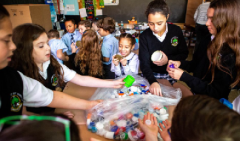前几天正好是藤校放榜日,相信大家最近都被一位华裔女孩刷了屏...这位看似普通的华裔女孩却横扫了八所藤校的offer,而且她申请的14所大学都对她抛出了橄榄枝...真是羡煞旁人,那么到底是为什么呢?

据美国新闻网The Tab报道,美国加州橙县华裔女学生萧靖彤(Cassandra Hsio)得知,她已被8所常春藤名校同时录取。
这8所名校包括:哈佛大学、普林斯顿大学、耶鲁大学、达特茅斯大学、布朗大学、哥伦比亚大学、康奈尔大学和宾夕法尼亚大学。因为同时被8所常春藤名校录取,所以卡桑德拉需要在这8所学校中做出选择。
据报道,在她的美国大学本科申请文书中,萧靖彤撰写了移民家庭学英语的真实故事,文章打动了8所名校的评委。
萧靖彤在文章中描述了她和母亲两人经历的语言煎熬。文章真实地描绘了很多新移民共有的特点。萧靖彤表示,语言并不是破碎的,而是带有一种情感。
“我们用文字建造了一栋房子。房子里虽然有点乱,但这就是我们打造自己家的地方。”
除了父母外,萧靖彤也十分感激她的老师、朋友及生活导师等人。
萧靖彤是一位多才多艺的女孩,在学校的时候经常做为一名青少年记者做一些采访,并且编写舞台剧故事。
被常春藤名校录取后,萧靖彤分享了她的大学申请经验,表示她的写作帮助她取得可喜成果。她还说,喜欢写作是源于自己从小就喜欢阅读。
萧靖彤在介绍她的申请作文时说,她的父母是第一代移民,妈妈出生在马来西亚,爸爸出生在中国台湾。
当她大约五岁的时候,一家人搬到了美国。英语不是他们的长项。萧靖彤说:“对我来说,在一个移民家庭中长大,是很有意思的。”由于英文发音不准,在这个家庭中,完全是用一种特殊的语言进行互动。
由于发音的不准确,萧靖彤不得不到语言专家那里进行训练。同学们也都笑话她,因为她把“accept”错发成“except”,将“success”错发成“sussess”。她说:“我在创意写作最需要语言的时候,但却失败了。”
萧靖彤在她的作文中称,在他们家,英语不是英文,不是在单词的意义上,而是在发音上。“snack”(小吃)被说成了“snake”(蛇),将“film”(电影)说成了“flim”。虽然是不正确的发音,但萧靖彤的家中彼此都能够互相听得懂。
在说到自己被这么多顶尖大学录取的感受时,萧靖彤说,她依然还在“消化”这些好消息,
“当你在电子信箱中里收到来自这些大学的邮件时,我看见一个一个的“yes”,一个一个的“恭喜”,这太不现实了。
我昨天自己哭了好一会儿,我和我的父母一起庆祝、这么多好大学都愿意录取我,这是我莫大的荣幸。”
同时,根据“世界日报”的报道,18岁的萧靖彤共申请14所大学的写作或新闻类学系,目前全部录取。 萧靖彤有感而发说:之所以申请这么多,主要是亚裔学生能力强,竞争激烈,很怕无法被录取,担心自己没选择。
萧靖彤说:“我接下来会去这些学校一一参观,再作决定。” 不过她透露自己一直很喜欢哈佛大学,七年级时她曾去过哈佛参观。
而这也告诉了我们,一份能够打动别人的文书到底有多么重要。
说到这里,大家一起来膜拜一下让人家的文书吧,看看差距到底在哪里????
不知道看完文书的你,有没有明白这位妹子到底是因为什么被八所藤校看上。刚开始看到这位华裔女孩照片的你可能会觉得,凭什么这位平凡的女孩就那么幸运被各个名校争相录取,但这份文书说明了一切。
In our house, English is not English. Not in the phonetic sense, like short a is for apple, but rather in the pronunciation – in our house, snake is snack.Words do not roll off our tongues correctly – yet I, who was pulled out of class to meet with language specialists, and my mother from Malaysia, who pronounces film as flim, understand each other perfectly.
In our house, there is no difference between cast and cash, which was why at a church retreat, people made fun of me for “cashing out demons.” I did not realize the glaring difference between the two Englishes until my teacher corrected my pronunciations of hammock, ladle, and siphon. Classmates laughed because I pronounce accept as except, success as sussess. I was in the Creative Writing conservatory, and yet words failed me when I needed them most. Suddenly, understanding flower is flour wasn’t enough. I rejected the English that had never seemed broken before, a language that had raised me and taught me everything I knew. Everybody else’s parents spoke with accents smarting of Ph.D.s and university teaching positions. So why couldn’t mine? My mother spread her sunbaked hands and said, “This is where I came from,” spinning a tale with the English she had taught herself. When my mother moved from her village to a town in Malaysia, she had to learn a brand new language in middle school: English. In a time when humiliation was encouraged, my mother was defenseless against the cruel words spewing from the teacher, who criticized her paper in front of the class. When she began to cry, the class president stood up and said, “That’s enough.” “Be like that class president,” my mother said with tears in her eyes. The class president took her under her wing and patiently mended my mother’s strands of language. “She stood up for the weak and used her words to fight back.” We were both crying now. My mother asked me to teach her proper English so old white ladies at Target wouldn’t laugh at her pronunciation. It has not been easy. There is a measure of guilt when I sew her letters together. Long vowels, double consonants — I am still learning myself. Sometimes I let the brokenness slide to spare her pride but perhaps I have hurt her more to spare mine. As my mother’s vocabulary began to grow, I mended my own English. Through performing poetry in front of 3000 at my school’s Season Finale event, interviewing people from all walks of life, and writing stories for the stage, I stand against ignorance and become a voice for the homeless, the refugees, the ignored. With my words I fight against jeers pelted at an old Asian street performer on a New York subway. My mother’s eyes are reflected in underprivileged ESL children who have so many stories to tell but do not know how. I fill them with words as they take needle and thread to make a tapestry. In our house, there is beauty in the way we speak to each other. In our house, language is not broken but rather bursting with emotion. We have built a house out of words. There are friendly snakes in the cupboard and snacks in the tank. It is a crooked house. It is a little messy. But this is where we have made our home.

据美国新闻网The Tab报道,美国加州橙县华裔女学生萧靖彤(Cassandra Hsio)得知,她已被8所常春藤名校同时录取。
这8所名校包括:哈佛大学、普林斯顿大学、耶鲁大学、达特茅斯大学、布朗大学、哥伦比亚大学、康奈尔大学和宾夕法尼亚大学。因为同时被8所常春藤名校录取,所以卡桑德拉需要在这8所学校中做出选择。
据报道,在她的美国大学本科申请文书中,萧靖彤撰写了移民家庭学英语的真实故事,文章打动了8所名校的评委。
萧靖彤在文章中描述了她和母亲两人经历的语言煎熬。文章真实地描绘了很多新移民共有的特点。萧靖彤表示,语言并不是破碎的,而是带有一种情感。
“我们用文字建造了一栋房子。房子里虽然有点乱,但这就是我们打造自己家的地方。”
除了父母外,萧靖彤也十分感激她的老师、朋友及生活导师等人。
萧靖彤是一位多才多艺的女孩,在学校的时候经常做为一名青少年记者做一些采访,并且编写舞台剧故事。
被常春藤名校录取后,萧靖彤分享了她的大学申请经验,表示她的写作帮助她取得可喜成果。她还说,喜欢写作是源于自己从小就喜欢阅读。
萧靖彤在介绍她的申请作文时说,她的父母是第一代移民,妈妈出生在马来西亚,爸爸出生在中国台湾。
当她大约五岁的时候,一家人搬到了美国。英语不是他们的长项。萧靖彤说:“对我来说,在一个移民家庭中长大,是很有意思的。”由于英文发音不准,在这个家庭中,完全是用一种特殊的语言进行互动。
由于发音的不准确,萧靖彤不得不到语言专家那里进行训练。同学们也都笑话她,因为她把“accept”错发成“except”,将“success”错发成“sussess”。她说:“我在创意写作最需要语言的时候,但却失败了。”
萧靖彤在她的作文中称,在他们家,英语不是英文,不是在单词的意义上,而是在发音上。“snack”(小吃)被说成了“snake”(蛇),将“film”(电影)说成了“flim”。虽然是不正确的发音,但萧靖彤的家中彼此都能够互相听得懂。
在说到自己被这么多顶尖大学录取的感受时,萧靖彤说,她依然还在“消化”这些好消息,
“当你在电子信箱中里收到来自这些大学的邮件时,我看见一个一个的“yes”,一个一个的“恭喜”,这太不现实了。
我昨天自己哭了好一会儿,我和我的父母一起庆祝、这么多好大学都愿意录取我,这是我莫大的荣幸。”
同时,根据“世界日报”的报道,18岁的萧靖彤共申请14所大学的写作或新闻类学系,目前全部录取。 萧靖彤有感而发说:之所以申请这么多,主要是亚裔学生能力强,竞争激烈,很怕无法被录取,担心自己没选择。
萧靖彤说:“我接下来会去这些学校一一参观,再作决定。” 不过她透露自己一直很喜欢哈佛大学,七年级时她曾去过哈佛参观。
而这也告诉了我们,一份能够打动别人的文书到底有多么重要。
说到这里,大家一起来膜拜一下让人家的文书吧,看看差距到底在哪里????
不知道看完文书的你,有没有明白这位妹子到底是因为什么被八所藤校看上。刚开始看到这位华裔女孩照片的你可能会觉得,凭什么这位平凡的女孩就那么幸运被各个名校争相录取,但这份文书说明了一切。
In our house, English is not English. Not in the phonetic sense, like short a is for apple, but rather in the pronunciation – in our house, snake is snack.Words do not roll off our tongues correctly – yet I, who was pulled out of class to meet with language specialists, and my mother from Malaysia, who pronounces film as flim, understand each other perfectly.
In our house, there is no difference between cast and cash, which was why at a church retreat, people made fun of me for “cashing out demons.” I did not realize the glaring difference between the two Englishes until my teacher corrected my pronunciations of hammock, ladle, and siphon. Classmates laughed because I pronounce accept as except, success as sussess. I was in the Creative Writing conservatory, and yet words failed me when I needed them most. Suddenly, understanding flower is flour wasn’t enough. I rejected the English that had never seemed broken before, a language that had raised me and taught me everything I knew. Everybody else’s parents spoke with accents smarting of Ph.D.s and university teaching positions. So why couldn’t mine? My mother spread her sunbaked hands and said, “This is where I came from,” spinning a tale with the English she had taught herself. When my mother moved from her village to a town in Malaysia, she had to learn a brand new language in middle school: English. In a time when humiliation was encouraged, my mother was defenseless against the cruel words spewing from the teacher, who criticized her paper in front of the class. When she began to cry, the class president stood up and said, “That’s enough.” “Be like that class president,” my mother said with tears in her eyes. The class president took her under her wing and patiently mended my mother’s strands of language. “She stood up for the weak and used her words to fight back.” We were both crying now. My mother asked me to teach her proper English so old white ladies at Target wouldn’t laugh at her pronunciation. It has not been easy. There is a measure of guilt when I sew her letters together. Long vowels, double consonants — I am still learning myself. Sometimes I let the brokenness slide to spare her pride but perhaps I have hurt her more to spare mine. As my mother’s vocabulary began to grow, I mended my own English. Through performing poetry in front of 3000 at my school’s Season Finale event, interviewing people from all walks of life, and writing stories for the stage, I stand against ignorance and become a voice for the homeless, the refugees, the ignored. With my words I fight against jeers pelted at an old Asian street performer on a New York subway. My mother’s eyes are reflected in underprivileged ESL children who have so many stories to tell but do not know how. I fill them with words as they take needle and thread to make a tapestry. In our house, there is beauty in the way we speak to each other. In our house, language is not broken but rather bursting with emotion. We have built a house out of words. There are friendly snakes in the cupboard and snacks in the tank. It is a crooked house. It is a little messy. But this is where we have made our home.

 相关文章
相关文章



 精彩导读
精彩导读






 热门资讯
热门资讯 关注我们
关注我们
